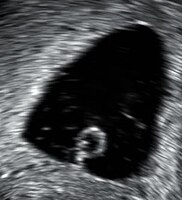
Photo from wikipedia
Prenatal ultrasounds often yield indeterminate (incomplete or minor abnormality) findings with limited clinical utility. We evaluate impact of indeterminate findings on maternal anxiety. A single-U.S.-center prospective cohort study administered the… Click to show full abstract
Prenatal ultrasounds often yield indeterminate (incomplete or minor abnormality) findings with limited clinical utility. We evaluate impact of indeterminate findings on maternal anxiety. A single-U.S.-center prospective cohort study administered the Perinatal Anxiety Screening Scale (PASS; control mean = 13.4; > 20 denotes clinically significant anxiety) before and after prenatal ultrasounds in February-May 2017. Ultrasound reports were coded as: normal; indeterminate; or major abnormality. Primary outcome was anxiety after indeterminate vs. normal ultrasounds. Secondary outcomes included anxiety change from pre-to-post-ultrasound and relative to women’s characteristics. Linear regression adjusted for confounders. Of 286 ultrasounds, 51.0% were normal, 40.5% indeterminate (22.0% incomplete; 18.5% minor abnormality), and 8.0% major abnormalities. Indeterminate findings were unrelated to age, race, parity, infertility, or psychiatric history, but associated with gestational age (26.6%/45.0%/52.5% for first/second/third trimesters; p < 0.001), and obesity (48.8 vs. 37.0%; p = 0.031). Pretest anxiety was highest in second/third trimesters (p = 0.029), and in subjects aged age ≤ 24 or younger(p < 0.001), with a history of anxiety (p < 0.001),) or with prior pregnancy loss (p = 0.011). Mean anxiety score decreased pre-to-posttest across all groups. Indeterminate findings were associated with higher PASS scores than normal findings: pretest 20.1 vs. 16.4 (p = 0.026) and posttest 16.9 vs. 12.2 (p = 0.009; adjusted-p = 0.01). Versus normal ultrasounds, incomplete findings were associated with higher post-ultrasound anxiety (p = 0.007; adjusted-p = 0.01) and smaller decreases from pre-to-posttest (adjusted-p = 0.03), whereas minor abnormalities had higher pretest anxiety (p = 0.029) with larger pre-to-posttest decreases (adjusted-p =0.010). Indeterminate ultrasounds, especially incomplete findings, are associated with significantly higher anxiety than normal findings, suggesting need for evidence-based counseling, management and strategies for decreasing number of indeterminate results.
Journal Title: Maternal and Child Health Journal
Year Published: 2021
Link to full text (if available)
Share on Social Media: Sign Up to like & get
recommendations!